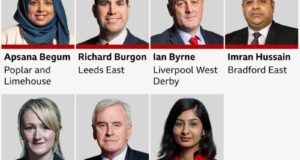 Jeremy Corbyn has told British voters they don’t have to accept that inequality and injustice are inevitable – and things “can and must change”.
Jeremy Corbyn has told British voters they don’t have to accept that inequality and injustice are inevitable – and things “can and must change”.
In his first conference speech after becoming Labour leader, Mr Corbyn vowed to create a “kinder politics, a more caring society”.
But he also attacked David Cameron’s “shocking broken promises” and said Labour would “challenge austerity”.
And he restated his belief in getting rid of Britain’s nuclear weapons.
Follow reaction to the speech on the Labour Conference Live page
Mr Corbyn arrived on stage in Brighton to a lengthy standing ovation from Labour delegates and his shadow cabinet, before delivering a 59 minute speech that eschewed the traditional section on the leader’s family and background.
There were jokes – he took a swipe at some of the press coverage he has received since his surprise Labour leadership victory – but he also spoke at length, and off the cuff, about his values and how he planned to change his party.
There were no policy announcements but he covered a broad range of issues including:
A challenge to David Cameron over Ali Mohammed al-Nimr, a protester who faces the death penalty in Saudi Arabia for a crime he allegedly committed aged 17
A vow to renationalise the railways
Urging David Cameron to come to the aid of steel workers facing job losses on Teesside “as the Italian government has done” with their industry
A promise to make every school accountable to local education authorities
Attacking the Tories’ “shocking” broken promises on child tax credits
Making solving the housing crisis his “top priority” with a very large and very active council house building programme”
Giving mental health parity in the NHS
Looking to expand statutory maternity and paternity pay to self-employed people
Following the speech, it was revealed a large section was based on a blog written in 2011.
Speechwriter Richard Heller wrote the passages and they were offered to previous Labour leader Ed Miliband, but not used.
Mr Heller told the BBC he had written to offer them to Mr Corbyn shortly after his election as leader, and had been “surprised” and “very glad” they were eventually used. He had been informed by Mr Corbyn’s office on Tuesday afternoon that the passages were to be used, he added.
In his speech, Mr Corbyn addressed head-on David Cameron’s claim that he represented a threat to the security of British families.
“How dare these people talk about security for families and people in Britain? There’s no security for the 2.8 million households in Britain forced into problem debt by stagnating wages and the Tory record of the longest fall in living standards since records began,” he said.
“And that’s the nub of it. Tory economic failure. An economy that works for the few, not for the many.”
Some members of the party have wanted to hear a speech like this for years.
And although he never really expected to be doing one of the most high-profile, hardest jobs in politics, if Jeremy Corbyn was nervous, he didn’t show it.
And goodness me, the audience was pleased to see him, applauding for two minutes on their feet before he even said a word.
Inside the hall his clarion calls, as he even highlighted, “strong message here”, were eagerly received, even though I caught the eyes of a fair number of stony-faced MPs.
He told Labour activists he was “unapologetic about reforming our economy to challenge inequality and protect workers better” and said people should not have to accept what was given to them by global corporations, and there should be no limit on what they could achieve.
“We are a rich country. These things are not necessary or inevitable. They can and must be changed.”
He said most British people shared his values, adding: “I know there’s a big British majority for building a more equal society, for eliminating poverty and homelessness.”
Contrary to some predictions, Mr Corbyn did not use the speech to issue an apology for the Labour Party’s role in taking Britain to war in Iraq under Tony Blair.
But he told the packed hall: “It didn’t help our national security when we went to war with Iraq in defiance of the United Nations and on a false prospectus.”
And he signalled his opposition to any government attempt to secure Parliament’s support for military action in Syria, saying a “diplomatic strategy” via the United Nations could secure peace.
He repeated his opposition to renewing the Trident nuclear weapons system, a stance not shared by his shadow defence secretary Maria Eagle, who he has asked to lead a review on the issue, but added the jobs and skills of people working in the defence industry had to be protected “so that we gain from this, we do not lose from this”.
And he attacked the “commentariat” for reporting “splits” in his top team, saying “this is grown-up, real politics where real people debate real issues”.
To a standing ovation, he added: “Cut out the personal abuse, cut out the cyber bullying, and especially cut out the misogynistic abuse.
“Let’s get on with bringing real values back into politics.”
His approach of allowing shadow Cabinet members to speak freely on issues where they disagree with him will continue.
“I am not imposing leadership lines. I don’t believe anyone has a monopoly on wisdom – we all have ideas and a vision of how things can be better,” he said.
“I want open debate, I will listen to everyone, I firmly believe leadership is listening.”
The “huge mandate” he had been given as leader was a “mandate for change”, he said
“It was a vote for change in the way we do politics, in the Labour Party and the country.”
BBC deputy political editor James Landale said the speech was “directed at the Labour Party itself”, with “not much of a message for the outside world”, but added that a reference to aspiration was “the germ of an interesting idea”.
For the Conservatives, Justice Secretary Michael Gove said: “The Labour leader’s policies to borrow more, print money and put up taxes on people’s jobs and incomes would wreck our economy. That would weaken our nation’s defences, damage our NHS and hurt our country’s working people – with the poorest hit the most.”
UKIP called the speech “fantastical”, saying: “His politics are underpinned by a naive and optimistic view of the world that is so shortsighted it is frankly dangerous.
“His words are like inspirational memes. Beguiling as they may be they all belong to a virtual world.”
A succession of union leaders welcomed the speech, saying there was now a “true” opposition.
Mark Serwotka, PCS general secretary, said Mr Corbyn had “brilliantly answered his critics”, while the Fire Brigades Union’s Matt Wrack said the speech could mark a “turning point in British politics”.
Business groups questioned some of Mr Corbyn’s message, however.
The British Chambers of Commerce said businesses would “not like the thought of an interventionist state propping up failing companies” and renationalising utilities, while the CBI said it shared Labour’s aim of spreading the proceeds of growth but “we don’t recognise Mr Corbyn’s characterisation of the economy”.
 Weekly Bangla Mirror | Bangla Mirror, Bangladeshi news in UK, bangla mirror news
Weekly Bangla Mirror | Bangla Mirror, Bangladeshi news in UK, bangla mirror news







